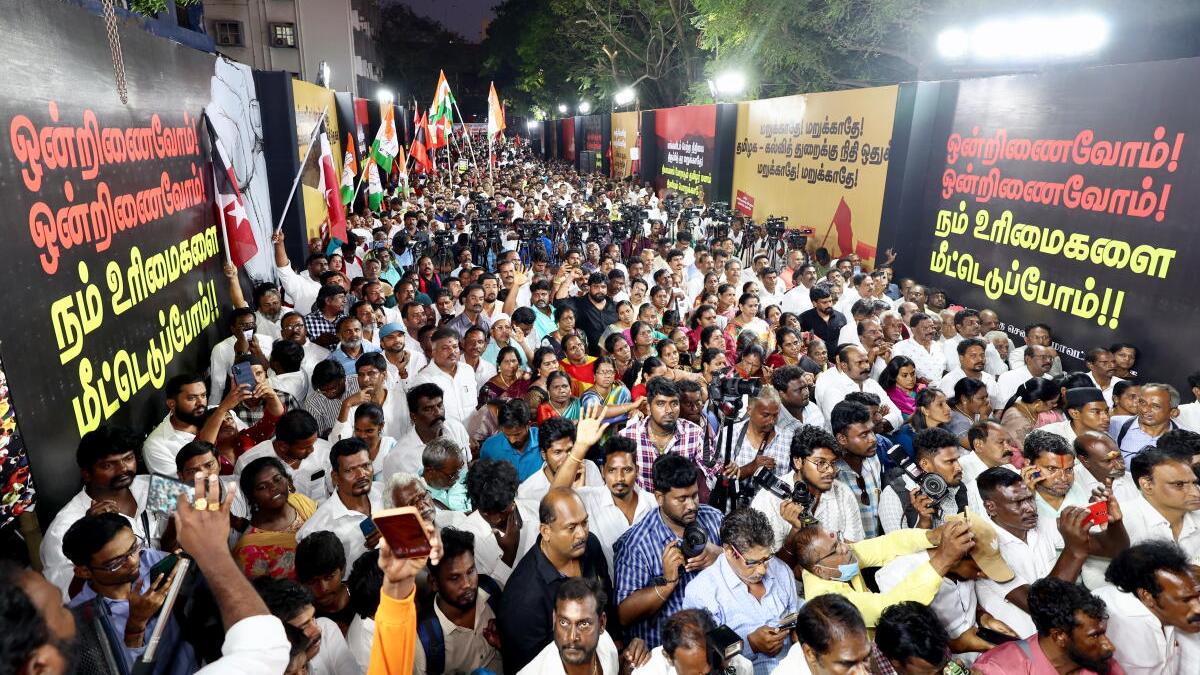People during a protest by DMK-led coalition against the BJP-led Central government for trying to impose the three-language policy under NEP 2020 in the State and other issues, in Chennai. | Photo: PTI
The Tamil Nadu government continues to express opposition to the National Education Policy (NEP) 2020, raising several concerns about its implementation. Tamil Nadu has formed a High-Level Committee aimed at creating an alternative State Education Policy. Other states like Kerala have similarly delayed implementing the NEP due to reservations regarding its provisions.
Central to Tamil Nadu’s objections is the restructuring of the education framework. The NEP proposes shifting from a 5+3+2+2 system to a 5+3+3+4 model, which includes introducing vocational education from Class VI onwards. However, it is the controversial three-language formula that has intensified opposition within the state. While the Union Government insists on linking fund disbursement under the Samagra Shiksha scheme to compliance with NEP guidelines, many question whether this approach respects regional linguistic diversity.
The Hindu conducted a live webinar on March 1, 2025, where experts delved deeper into these issues. Among them are Professor S. P. Thyagarajan and Professor Jawahar Nesan—both academics with extensive experience in education policy reform. They provided insights into whether early vocational education can coexist with traditional learning methods and explore potential implications of enforcing a three-language policy in Tamil Nadu.
Need for reforms
Both panellists emphasize the need to constantly update the education policies of a country. They say that advanced countries support education to the maximum level through reform and financial support, citing examples of countries such as U.S. Sweden, Germany, and more. It becomes necessary that periodic reforms are necessary for the positioning of the country in the global scenario.
Citing another reason for the need of educational reforms, Professor Thyagarajan says that reforms are needed for employability. He cites reports which say that currently only 54% of people in the country are employed, among them, however, 25% of the educated section is underemployed. It is low figure. “The primary criticism by multinational companies is that candidates lack domain knowledge, skills required, and attitude suited for the jobs. So it is necessary to have reforms happening periodically”, said Professor Thyagarajan.
Sanskritisation
Professor Nesan says that NEP has already been implemented in full swing across States. Even those that are opposing the policy have silently directly or indirectly implemented certain aspects of the policy. He says we need to accept that NEP is a reality and people are already experience its advantages and disadvantages.
Professor Nesan’s says that it is a holistic policy. The different elements of NEP are contributory to each other and they cannot be segregated, be it the multilingual policy, vocational education, or the 5+ 3 + 3 + 4, or others. He says they are all holistic embodiment of a system.
Professor Nesan says that with these mechanisms the Central establishment wants to make an Indian society based on the taste and aspirations of those who are trying to impose the NEP. The principle on which it is based is the Indian Knowledge System. He says it is the Vedic knowledge system, which is the experience of only a segment of society, and they are trying to make a monotonous society, with one identity and one philosophy of Sanskritisation.
Critics argue that mandating a third language — while allowing for native Indian languages other than Hindi — may still disadvantage students who are already grappling with learning two languages in an academic environment focused primarily on core subjects like science and mathematics. There is concern over how effectively children can learn three languages simultaneously without compromising their grasp of essential academic content.
With ongoing debates surrounding educational reforms nationwide, particularly regarding employability and skill development for youth in India’s evolving job market, understanding local contexts becomes crucial. As such discussions unfold, finding middle ground that accommodates both national objectives and state-specific needs remains imperative.
The future of education in Tamil Nadu hangs in balance as stakeholders grapple with these complex issues—a resolution that meets diverse demands will be essential for advancing educational outcomes across all regions of India.
Published – March 05, 2025 06:15 pm IST
